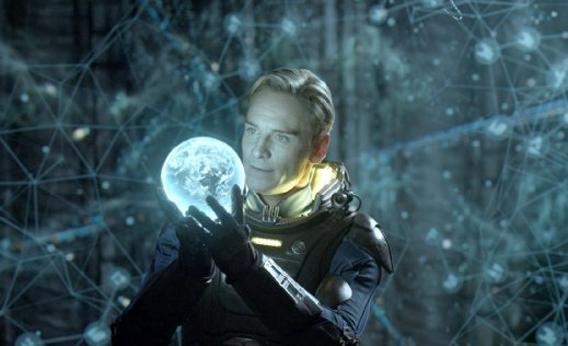Prometheus
Ridley Scott’s dazzling-looking Alien prequel is deep without being particularly smart.

Still courtesy Twentieth Century Fox Film.
After you've seen Prometheus, come back and listen to our Spoiler Special:
Prometheus (20th Century Fox), Ridley Scott’s return to visionary science fiction three decades after Alien and Blade Runner, opens big, with an aerial 3-D camera sweeping low over panoramic landscapes so vast and bleak it’s as if the location scout actually visited outer space. (The sheer cliff drops and glacial expanses seen in this stunning opening sequence are in fact located in Iceland.) At the edge of a waterfall in this austere setting stands a humanoid creature whose marble-white skin and exaggerated muscle definition recall classical statuary. He ingests a small dish of what looks like bubbling caviar—then immediately and spectacularly crumbles to dust. As the organic material of his body washes away, we watch DNA-like structures twist and form in CSI-style micro-closeup.
This is a whiz-bang beginning for a movie, with its implicit suggestion that the origin of human life may have involved some form of alien self-sacrifice. Unfortunately, nothing that happens for the rest of Prometheus equals or, for that matter, explains its striking prologue. Co-scripted by Damon Lindelof of Lost, this film shares that series’ love for nested mythologies and involute philosophical riddles. Prometheus is more interested in piling on big questions than in answering them. It’s deep without being particularly smart, although the dazzling design and special effects keep you from noticing that basic flaw until at least an hour in.
After Caviar Man takes his fateful dive, we move to Earth in 2089, a few decades before the beginning of Alien (to which this movie positions itself as a kind of prequel). Two archeologists, Elizabeth Shaw (Noomi Rapace) and Charlie Holloway (Logan Marshall-Green), explore a prehistoric cave whose wall paintings suggest contact between early man and an alien visitor—a pattern the scientists (who are also a couple) have noticed in sites around the world. On the strength of this pair’s crackpot-sounding theory, an ominous group known as the Weyland Corp. (Put it this way: The chairman is a dead man who appears only in the form of a pre-recorded hologram) agrees to underwrite an exploratory space mission to seek out the origin of human life.
The titular ship (which, like many unwisely named sci-fi vessels, might as well be christened the USS Hubris) sets out for an Earth-like planet in a distant solar system, manned by a crew that’s placed in suspended animation for the bulk of the journey. The only creature minding the ship is David (Michael Fassbender), an unsettlingly lifelike android. He passes his time on the empty, silent vessel monitoring the ship’s progress and watching Lawrence of Arabia for tips on human behavior. As they approach their destination, David begins to rouse his fellow crewmembers from their sleep pods: the ship’s laconic pilot, Janek (Idris Elba); an uptight representative of the Weyland Corp., Vickers (Charlize Theron); the archeologist couple; and a few other characters who (not to spoil anything) might not be worth getting overly invested in.
Once the crew lands on the planet’s surface and begins exploring the huge ancient structure they find there, their mistakes pile up pretty quickly. It probably wasn’t a smart idea for Elizabeth to bag up the fossilized head of a dead alien they find in one chamber and bring it onboard the ship for examination. It definitely didn’t make sense for two disgruntled geologists (Rafe Spall and Sean Harris) to peel off from the main group and start back for the ship on their own. And if you’re stranded for the night in a vast, labyrinthine structure on another planet, you might think twice about approaching the gray-green phallic snake-thing that rises up suddenly from a puddle of black ooze and addressing it with a cajoling, “Hey, little guy.”
After the first round of redshirts meet their grisly ends, things really start to get weird aboard the Prometheus. Looking in the mirror, Charlie sees, or imagines he sees, a tiny worm peeking out of his eyeball (an effective moment of minimalist body horror that evokes David Cronenberg’s The Fly.) Later, David coolly informs Elizabeth that she’s pregnant with an alien life form, resulting in a gynecological horror scene that’s both the movie’s most memorable set piece and the mark of its irrevocable descent into implausibility. The last half hour is a blur of chases, explosions, and battles (man-on-man, monster-on-man, and monster-on-monster).
Prometheus could have been an elegant, moody sci-fi actioner if only it didn’t strain so hard (especially in the final scenes) for weighty existential meaning. There’s an ongoing theological debate between the atheist android David—who, as a manmade being, resists the idea of a divine creator—and the Christian truth-seeker Elizabeth, who insists on wearing a cross under her spacesuit even as the evidence pours in that the creatures who engineered us are indifferent if not outright malevolent. “Where do we come from? What is our purpose? What happens when we die?” David asks a human character at one point, enumerating the questions that drive the ship’s mission. Thanks to Fassbender’s precise, witty performance—when he’s on screen, the movie snaps to attention—David sounds both mocking of human curiosity and wistfully envious of it.
But as Prometheus’ characters wrestle with these slippery abstract questions, the concrete and immediate ones raised by the story itself go unanswered. What were the motives of our marble-skinned forebears in creating us, given that they now seem bent on destroying us? And what are David’s motives as he commits acts that seem intended to sabotage the ship’s mission? To judge by a closing teaser that links this movie’s rapidly mutating beasts to the multi-mouthed xenomorphs of Alien, we’ll have to wait until the next installment in the franchise to find out. After all the strenuous philosophizing that came before, the ending’s floppy irresolution feels less like a sophisticated embrace of ambiguity than like a profound cosmic cop-out.
